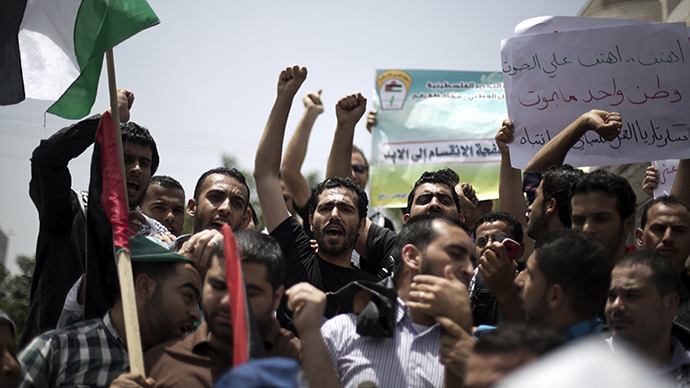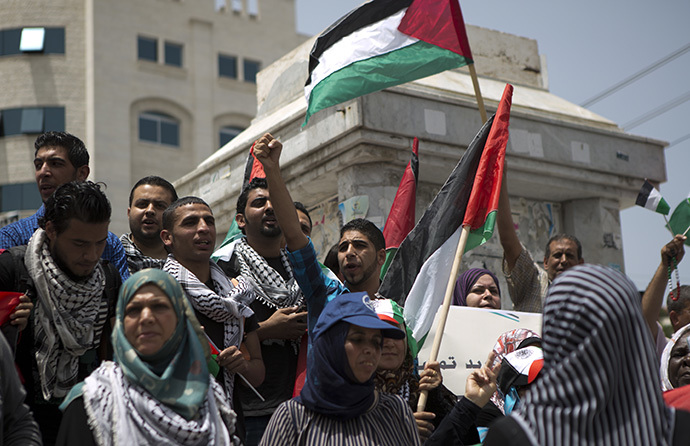‘Without outside pressure on Israel the issue of Palestine won’t be solved’

Outside pressure on the current Israeli government is critical for the progress of the Israel-Palestine peace process, but many are reluctant to confront Israel directly, the former director general of the Israeli Foreign Ministry, Alon Liel, told RT.
Dozens of Palestinians have rallied in Gaza city to demand Hamas and the Palestine Liberation Organization form a unity government on Wednesday, on the eve of the 50th anniversary of the founding of the Palestine Liberation Organization. The Two political groups are currently negotiating the process of ruling together.
Alon Liel believes the momentum among the Palestinians is improving.
RT:There have been decades of confrontation and years of attempts at talks between Israel and Palestinians. Are there any visible results?
Alon Liel: There were ups and downs in the last 20 years. We have been talking for the last two decades, but the recent wave of talks collapsed about three weeks ago, and we are empty-handed. We see no possibility to resume the negotiations in the foreseeable future. Those of us who believe in the possibility of peace and two states are in a state of shock. Each camp, each country, Israel and Palestine, is looking for its own way now. It is a very dangerous situation.
RT:There has been a lot of factional fighting between Palestinians. Why is it so difficult for the different groups to unite for a common goal?
AL: First of all, what they are doing this week - building a unity government between Fatah and Hamas is breaking a three-year deadlock or even more in the relations between the two sides and is an improvement. Once they have a joint government, there is one address again. Until this week there were two different addresses, one in the West Bank, another one in Gaza. So the momentum among the Palestinians is improving. By the way, in Israel we have of course one government, but also many different views about how to proceed and divergent opinions exists not only among the Palestinians, but also inside Israel.

RT:The international community has said that Israel is occupying some Palestinian lands, there's also been widespread condemnation of Israel's settlement expansion. Is the world as powerless as it seems to influence the situation?
AL: Inside Israel the majority of Israelis agree with this situation of continuous settling and occupation in the West Bank. I do not see a possibility of the Israeli political map creating a majority around the alternative of withdrawing and enabling a Palestinian state. So, outside pressure is critical. Without outside pressure on the contemporary Israeli government and prime minister nothing will work. When it comes to the individual governments, including the US, the pressure is very mild. Israel has become a relatively strong country, and governments are reluctant to confront directly with Israel. So it is the UN mostly that can make the difference.
RT:There have been some breakthroughs in recent years with the status of Palestine being changed in some international organizations like UNESCO. Are we likely to see full recognition of Palestinian state soon?
AL: This is the key question. In the UN, in November 2012, there was already a decision that Palestine was recognized as a state. Now, with the collapse of the talks, the Palestinians are considering approaching the Security Council to become a member state of the UN. This, by the way, will be an unbelievable blow to the Israeli government. Obviously, the Israeli government does not want it to happen. I do not know about the US position at the moment. But I think, as part of the Israeli peace camp, if there are no direct talks with the Palestinians that can bring an agreement, the Palestinians should go to the UN, to the Security Council, and ask for member status. If they get it, I am quite sure Israel will run to the table again.
RT:Israel's ongoing economic blockade is having serious consequences on people in the Palestinian territories. Are there any signs of the humanitarian situation improving?
AL: We have to separate between the West Bank and Gaza. There is no blockade in the West Bank, but there is one in Gaza, but goods are coming in and out. I do not think that this blockade is the key issue. We do not hear about starvation in Gaza, or about the collapse of the economy there. I think the key issue is the political one, not the economical. Prime Minister Netanyahu is speaking a lot of economic peace, saying that we will upgrade the standard of living in the West Bank, and then they will be happy. But I think the political question is still in the center of the matter. Is Israel going to divide the land between Jordan and the Mediterranean into two separate countries or it is going to build one bi-national state. Then the question is the rights of the Palestinians in this state. I think the blockade is not the key question, but the question of building of one state, the Israeli state, which will include about 5 million Palestinians as inhabitants, but not probably as citizens.
The statements, views and opinions expressed in this column are solely those of the author and do not necessarily represent those of RT.
The statements, views and opinions expressed in this column are solely those of the author and do not necessarily represent those of RT.











